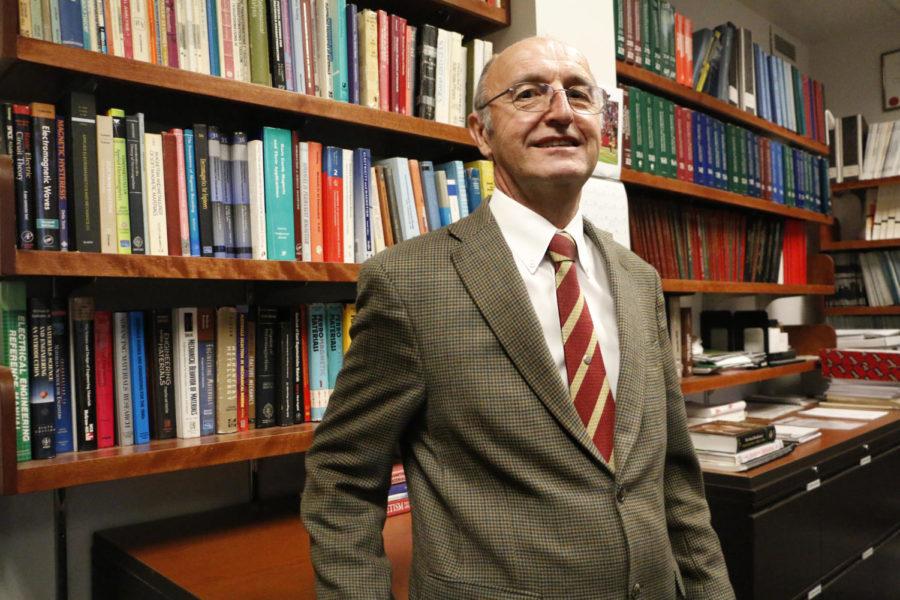A work in progress: Professor earns recognition from Royal Academy
October 2, 2014
David Jiles’ career has been a work in progress since he first discovered his love for physics as a 14-year-old in London. That love led to him being elected to the Royal Academy of Engineering this year.
“[It’s] still a work in progress,” said Jiles, Anson Marston Distinguished Professor in Engineering, in regard to his prestigious research.
Jiles earned his Ph.D. from The University of Hull in Yorkshire, UK, in 1979. After working in New Zealand and Canada, Jiles brought his family to Ames in 1984 when offered a position at Iowa State.
“[The position] basically described everything I was doing at the time,” said Jiles. “I thought to myself, ‘Wow, that’s me!’”
He transitioned to Iowa State, and published his first major research paper in 1986. His research attracted a lot of attention, but was not widely accepted.
Jiles said he believes that this first piece of research was the most influential work he has done because it led him to his current research, which has received prestigious recognition.
Jiles has a passion for his work. Since being encouraged by a friend to begin the Royal Academy of Engineering’s election process two years ago, he has worked diligently to verify his work.
By the end of 2013, the meticulous verification process was completed.
After months of silence on the subject, he received an envelope from the Royal Academy. As he sat with the envelope in his hands he recalled feeling unsure whether or not to open it.
“[If] I opened it, it had to go one way in the other,” said Jiles, “So in a way, I didn’t want to open it.”
After mustering up the courage to open the letter, Jiles could proudly announce that he was elected to The Royal Academy of Engineering for his work with Ferromagnetic Hysteresis.
Hysteresis is the study of a system’s outputs based on current and past inputs. Jiles’ study of Ferromagnetic Hysteresis explores parameters defining hysteresis in the theory of hysteresis. Parameters can be obtained from a collection of experimental magnetization measurements.
To accept this award, Jiles and his wife will travel to the United Kingdom in November for his induction and an awards dinner.
Jiles said the award is a testament his work, and inspires him to further his research and continue to work with others.
Jiles, the Palmer Endowed Department Chair in Computer and Electrical Engineering, is not shy when attributing a large part of his success to Iowa State and those who work with him.
“In the end,” said Jiles, “it comes down to the people.”
According to Jiles, keeping his program well-funded while using time effectively, managing students and steadily releasing research is no simple task.
His response to the challenges he faces: “If you don’t love it, you shouldn’t do it.”
The award means his peers have accepted his work and has brought recognition to Iowa State, Jiles said.
“Iowa State doesn’t realize how great it is,” he said. “Iowa State is a wonderful place. We don’t realize how well-known we are.”
Jiles has strong advice for the students at Iowa State.
“You have to decide what you want. And then you have to pursue it with all your energy,” Jiles said.
His advice inspires freshman agricultural engineering student, Michael Tupper, to dedicate himself to his field of study. Tupper has high expectations of his professors.
“[I expect professors to] prepare students for real-world engineering issues,” said Tupper, “and to give us the tools to overcome these issues.”
Jiles’ work is motivating students, like Michael Tupper, to take advantage of the opportunities Iowa State has to offer, and to become competitive in the local and global market.
“When you come to Iowa State you know you are competing,” Tupper said. “The grade of professors at Iowa State is what makes the university strong. It brings research dollars to the programs and bright minds to campus.”
Tupper said Jiles’ election to The Royal Academy proves how well-equipped Iowa State is to prepare students for the future.
Jiles’ accomplishment sets the bar of excellence high for the students of Iowa State.
Associate Dean of Research Arun Somani, said Jiles is a “born scientist” with great capacity and leadership.
Jiles’ is noted as an “amazing, hardworking person with great focus” by Somani.
His focus and work ethic does not affect the level of communication and mentoring that he shares with the students of Iowa State, Somani said.
“[He] radiates energy and is easy to communicate with,” Somani said. “He has an ability to motivate all and truly loves Iowa State University.”
Somani said Jiles’ election to The Royal Academy of Engineering provides recognition for the university and the people who work there.
“It does two things,” he said, “it motivates others to aspire to Jiles’ level of success and it puts Iowa State on the map.”
David Jiles may be known globally as a renowned scientist and author, but to the students and faculty of Iowa State, he is known as a motivator, leader and member of the Cyclone family.

















